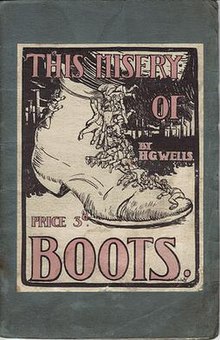This Misery of Boots

First Edition Cover
|
|
| Author | H. G. Wells |
|---|---|
| Country | United Kingdom |
| Language | English |
| Genre | Tract |
| Publisher | Fabian Society |
|
Publication date
|
1907 |
| Media type | Print (Paperback) |
| Pages | 42 |
| Preceded by | Socialism and the Family |
| Followed by | New Worlds for Old (H. G. Wells) |
This Misery of Boots is a 1907 political tract by H. G. Wells advocating socialism. Published by the Fabian Society, This Misery of Boots is the expansion of a 1905 essay with the same name. Its five chapters condemn private property in land and means of production and calls for their expropriation by the state "not for profit, but for service."
Wells's point of departure is a reminiscence of a conversation with "a realistic novelist . . . a man from whom hope had departed." An encounter with a limping tramp spurs a discussion of the 10–20% of the British population that suffers from "this misery of the boot." They classify the various sources of discomfort (bad material, bad fit, bad condition, various sorts of chafe, the wear of the sole, splitting and leaks, etc.) and agree that most boots are a constant source of “stress, giving pain and discomfort, causing trouble, causing anxiety.” But Wells's friend finds the subject too depressing to continue: “It does not do to think about boots, he exclaims.
Wells, however, disagrees. "[A]ll these miseries are preventable miseries, which it lies in the power of men to cure," he proclaims, and cites another friend who has achieved prosperity and no longer endures "the miseries of boots" but now suffers all the more, albeit vicariously, from the miseries of others, because he no longer believes that they are "in the very nature of things." He blames the statesmen who "ought to have foreseen and prevented this." Wells exhorts his readers not to "be humbugged for a moment into believing that this is the dingy lot of all mankind. . . . Don't say for a moment: 'Such is life.'"
Wells says he is not advocating a "childish and impossible equality," but insisting that "There is enough good leather in the world to make good sightly boots and shoes for all who need them, enough men at leisure and enough power and machinery to do all the work required, enough unemployed intelligence to organise the shoemaking and shoe distribution for everybody." What prevents this is "this institution of Private Property in land and naturally produced things," the "claim and profit" of "land-owners, cattle-owners, house-owners, owners of all sorts." The solution lies in "refusing to have private property in all these universally necessary things." Wells endorses expropriation by "the State" and the administration of land, railways, shipping, and businesses "not for profit, but for service."
Private property in land and "many things of general utility" is no more "necessary and unavoidable" than "private property in our fellow-creatures, or private property in bridges and roads." Wells denies any owner's right to compensation, but adds that "it is quite conceivable that we may partially compensate the property owners and make all sorts of mitigating arrangements." Wells denies that the rich will uniformly oppose socialism and asserts that many of this class will see that they would be "happier and more comfortable in a Socialistic state of affairs." It is, rather, "the ignorance, the want of courage, and the stupid want of imagination of the very poor" that is more likely to "obstruct the way to Socialism."
...
Wikipedia
